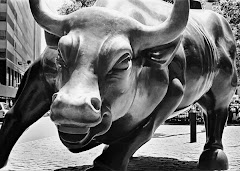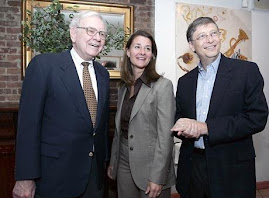Protecting Your Earnings
So after you made some money from the equity, and the bubble looks like it’s going to burst, what would you do? For most retail investors and people lacking investment knowledge, they will probably do what they have been doing – continue buying and selling stocks. But for the smarter ones, and those who had learnt their lesson (including myself), we know that protecting your earnings is more important than worrying that you might miss the continuous bull.
And if you are a newbie in stock market, I need to let you know on that the most important mission after making money from the stock market – DON’T RETURN BACK YOUR EARNINGS. It is not easy, considers that we are human of greed. And it needs profound knowledge and strategy to protect your earnings. Many years ago, I was searching for methods/strategy to protect earnings during an economic downturn. I am not worry at all of short-term correction; I am worried of economic downturn. And I believe that I had found the answer. In 2006, I attended a few seminars conducted by the SGX not because I am new to stock market, but because I wanted to know if there is anything I don’t know. I also wanted to take the opportunity to ask the speaker on “how to ride over an economic crisis”. I already have the answer in my heart but I like to have a confirmation from the experts.
I spoke to one of the speaker Mr Teong, a private fund manager. He shared with me on how he managed to survive the Asian Financial Crisis. In essence, as a private fund manager, he has the power and flexibility to switch to different asset class to maximize returns and to shun away from risky assets. Unlike those registered/regulated funds, he switched to fixed income instrument when Asia markets collapse in 1997. He successfully protected his investors’ money. But for a MAS registered fund (or unit trust), it cannot change its investment objective and policy as it likes. This means that if you bought technology fund in 2000, the fund will continued to invest 80% (if so stated) of it in technology stocks. Whether the technology stock will clash or the economy entering a downturn is irrelevant. So as least now you know that when there is an economic crisis, or you think that it is coming, you should be ready to get out of equity fund. Otherwise you will see your fund plunged together with the economy until it reached the bottom.
But note that it is also in the investors’ interest that the fund manager follows closely to the stated objective and policy. You certainly don’t want your fund manager to suddenly switch your money to some schemes (such as MLM) because it promise high return.
Foreign Currency Deposit
When the economy is shaky, one way to protect your earnings is to place them in a secured asset that provides reasonable returns. This asset should preferably have a negative correlation or at least uncorrelated to the economy. A fixed income instrument is one such asset. Recently, one of my friends told me that he took out his money from a NZD deposit and would like to put it somewhere else other than the stock market and local saving deposit. I recommended him to study Singapore Government Bonds. I will share with you more on bonds some other day.
And so now I am interested to know what kind of returns can we expect from a foreign currency deposit. I checked the DBS bank’s website for their rates and computed the expected returns from these foreign deposits that the bank is offering.
Firstly, I created a (formulated) spreadsheet so that by.JPG) keying those numbers, the spreadsheet will calculated the annualized returns. Then I put together the result of all the foreign currency deposits. Take note that Japanese Yen is not included as the interest rate is a wonderful 0%. For Malaysia Ringgit and Chinese’s Rmb, is not tradable outside its territory. Actually I was more interested in Chinese’s Rmb but unfortunately. From the table, we can make some conclusion:
keying those numbers, the spreadsheet will calculated the annualized returns. Then I put together the result of all the foreign currency deposits. Take note that Japanese Yen is not included as the interest rate is a wonderful 0%. For Malaysia Ringgit and Chinese’s Rmb, is not tradable outside its territory. Actually I was more interested in Chinese’s Rmb but unfortunately. From the table, we can make some conclusion:
1) Bank charges high commission (through the bid and offer gap).JPG) and very high for some currency. If you open a Swiss Franc or Hong Kong Dollar deposit, you make a loss instantly.
and very high for some currency. If you open a Swiss Franc or Hong Kong Dollar deposit, you make a loss instantly.
2) Only a few foreign currency deposits offer a return that is higher than our local fixed deposit. Others offer unattractive returns (or losses) plus exchange risk.
3) The best deposit comes from the Sterling Pound with annualized returns of 3.8%. The next best is the New Zealand dollar. It seems that my friend was lucky after all.
4) The returns is also the threshold to the investor on exchange risk. If the exchange rate turned against you more than the annualized return, you made a loss.
Take note that:
1) The bid and offer is based on current quote. I can also project the exchange movement one year down the road and put in the figure to do sensitivity analysis.
2) The bank only charge (exchange rate) commission two times; when you buy and sell. So if you keep the deposit rolling, then your returns will be better. But on the other hand, if you keep it for too long, your exchange risk will be greater.
Conclusion
So as you can see, no matter what happen to you, the bank still earns a lucrative commission whenever you buy or sell. And this commission is even higher than local fixed deposit rate. That’s why I always scrutinize my investment whenever a bank is involved. I will do my best to ensure that bank does not earn an extra cent from me unless it is absolutely necessary.
In my opinion, most of the foreign currency deposits are unattractive. This is because you get exchange risk for the returns that can’t even match our CPF Special Account (CPFSA). And that is exactly why I frequently advised my friends not to touch their CPFSA. Personally, I use CPFSA rate as a ‘risk-free’ rate instead of Treasury Bills to evaluate potential investment. However, if there is a chance to invest in China's Yuan or Malaysia's Ringgit, I would not hesitate. Basically these two economy's currency is undervalued. So you better watch out for that chance. Lastly, if you like to have my spreadsheet or you found fundamental error, drop me a message please.
So after you made some money from the equity, and the bubble looks like it’s going to burst, what would you do? For most retail investors and people lacking investment knowledge, they will probably do what they have been doing – continue buying and selling stocks. But for the smarter ones, and those who had learnt their lesson (including myself), we know that protecting your earnings is more important than worrying that you might miss the continuous bull.
And if you are a newbie in stock market, I need to let you know on that the most important mission after making money from the stock market – DON’T RETURN BACK YOUR EARNINGS. It is not easy, considers that we are human of greed. And it needs profound knowledge and strategy to protect your earnings. Many years ago, I was searching for methods/strategy to protect earnings during an economic downturn. I am not worry at all of short-term correction; I am worried of economic downturn. And I believe that I had found the answer. In 2006, I attended a few seminars conducted by the SGX not because I am new to stock market, but because I wanted to know if there is anything I don’t know. I also wanted to take the opportunity to ask the speaker on “how to ride over an economic crisis”. I already have the answer in my heart but I like to have a confirmation from the experts.
I spoke to one of the speaker Mr Teong, a private fund manager. He shared with me on how he managed to survive the Asian Financial Crisis. In essence, as a private fund manager, he has the power and flexibility to switch to different asset class to maximize returns and to shun away from risky assets. Unlike those registered/regulated funds, he switched to fixed income instrument when Asia markets collapse in 1997. He successfully protected his investors’ money. But for a MAS registered fund (or unit trust), it cannot change its investment objective and policy as it likes. This means that if you bought technology fund in 2000, the fund will continued to invest 80% (if so stated) of it in technology stocks. Whether the technology stock will clash or the economy entering a downturn is irrelevant. So as least now you know that when there is an economic crisis, or you think that it is coming, you should be ready to get out of equity fund. Otherwise you will see your fund plunged together with the economy until it reached the bottom.
But note that it is also in the investors’ interest that the fund manager follows closely to the stated objective and policy. You certainly don’t want your fund manager to suddenly switch your money to some schemes (such as MLM) because it promise high return.
Foreign Currency Deposit
When the economy is shaky, one way to protect your earnings is to place them in a secured asset that provides reasonable returns. This asset should preferably have a negative correlation or at least uncorrelated to the economy. A fixed income instrument is one such asset. Recently, one of my friends told me that he took out his money from a NZD deposit and would like to put it somewhere else other than the stock market and local saving deposit. I recommended him to study Singapore Government Bonds. I will share with you more on bonds some other day.
And so now I am interested to know what kind of returns can we expect from a foreign currency deposit. I checked the DBS bank’s website for their rates and computed the expected returns from these foreign deposits that the bank is offering.
Firstly, I created a (formulated) spreadsheet so that by
.JPG) keying those numbers, the spreadsheet will calculated the annualized returns. Then I put together the result of all the foreign currency deposits. Take note that Japanese Yen is not included as the interest rate is a wonderful 0%. For Malaysia Ringgit and Chinese’s Rmb, is not tradable outside its territory. Actually I was more interested in Chinese’s Rmb but unfortunately. From the table, we can make some conclusion:
keying those numbers, the spreadsheet will calculated the annualized returns. Then I put together the result of all the foreign currency deposits. Take note that Japanese Yen is not included as the interest rate is a wonderful 0%. For Malaysia Ringgit and Chinese’s Rmb, is not tradable outside its territory. Actually I was more interested in Chinese’s Rmb but unfortunately. From the table, we can make some conclusion:1) Bank charges high commission (through the bid and offer gap)
.JPG) and very high for some currency. If you open a Swiss Franc or Hong Kong Dollar deposit, you make a loss instantly.
and very high for some currency. If you open a Swiss Franc or Hong Kong Dollar deposit, you make a loss instantly.2) Only a few foreign currency deposits offer a return that is higher than our local fixed deposit. Others offer unattractive returns (or losses) plus exchange risk.
3) The best deposit comes from the Sterling Pound with annualized returns of 3.8%. The next best is the New Zealand dollar. It seems that my friend was lucky after all.
4) The returns is also the threshold to the investor on exchange risk. If the exchange rate turned against you more than the annualized return, you made a loss.
Take note that:
1) The bid and offer is based on current quote. I can also project the exchange movement one year down the road and put in the figure to do sensitivity analysis.
2) The bank only charge (exchange rate) commission two times; when you buy and sell. So if you keep the deposit rolling, then your returns will be better. But on the other hand, if you keep it for too long, your exchange risk will be greater.
Conclusion
So as you can see, no matter what happen to you, the bank still earns a lucrative commission whenever you buy or sell. And this commission is even higher than local fixed deposit rate. That’s why I always scrutinize my investment whenever a bank is involved. I will do my best to ensure that bank does not earn an extra cent from me unless it is absolutely necessary.
In my opinion, most of the foreign currency deposits are unattractive. This is because you get exchange risk for the returns that can’t even match our CPF Special Account (CPFSA). And that is exactly why I frequently advised my friends not to touch their CPFSA. Personally, I use CPFSA rate as a ‘risk-free’ rate instead of Treasury Bills to evaluate potential investment. However, if there is a chance to invest in China's Yuan or Malaysia's Ringgit, I would not hesitate. Basically these two economy's currency is undervalued. So you better watch out for that chance. Lastly, if you like to have my spreadsheet or you found fundamental error, drop me a message please.



